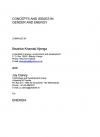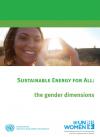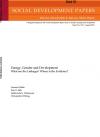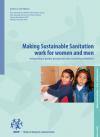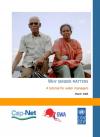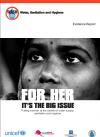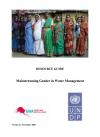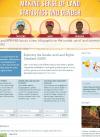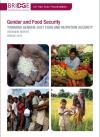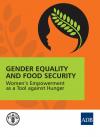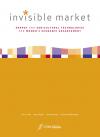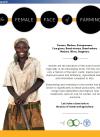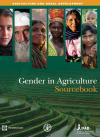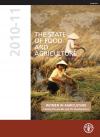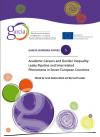Resources
13 Sep 2016
ENERGIA:
Background paper defines gender concepts and places them in the context of the energy sector, and describes issues of gender and energy
TYPE: Reports
12 Sep 2016
United Nations Industrial Development Organization (UNIDO) and UN Women, 2013:
Guidance Note provides a brief overview of issues related to gender equality, women’s empowerment and sustainable energy
TYPE: Policy briefs
12 Sep 2016
World Bank, 2011:
Background paper to World Development Report 2012: Gender Equality and Development reviews the literature on the links between energy access, welfare, and gender in order to provide evidence on where gender considerations in the energy sector matter and how they might be addressed
TYPE: Reports
12 Sep 2016
Women In Europe for a Common Future (WECF), 2009:
Background information on the need to integrate a gender perspective into the efforts to promote safe and sustainable sanitation, with guidance on how to mainstream gender into this sector
TYPE: Reports
12 Sep 2016
CAP-NET/Gender and Water Alliance (GWA)/UNDP, 2006:
Tutorial shows how addressing gender will improve efficiency of water use, environmental sustainability, and social benefits and equity from use of water resources
12 Sep 2016
Water Supply and Sanitation Collaborative Council (WSSCC)/Water, Engineering and Development Centre (WEDC), 2006:
Report describes how both women and communities as a whole benefit from involving women in water supply and sanitation projects, with key messages and recommendations
TYPE: Reports
12 Sep 2016
Gender and Water Alliance/UNDP, 2006:
Compilation of newer resources – documents, papers, books, case studies, tools and toolkits – on gender mainstreaming in Integrated Water Resource Management (IWRM) to assist water and gender practitioners and professionals as well as persons responsible for gender mainstreaming
09 Sep 2016
FAO:
Database provides gender and land-related statistics, national-level profiles of legal frameworks and policies and programmes to support the advancement of women or induce gender-differentiated access to land, and an interactive tool to visualize and compare gender-equitable land tenure policies across countries.
TYPE: Data
Read at Database on FAO website
09 Sep 2016
BRIDGE, Institute of Development Studies (IDS), 2014:
Report makes the case for a new, gender-aware understanding of food security, arguing that in order to truly achieve food security for all in gender equitable ways, responses need to be rights-based, gender-just and environmentally sustainable
TYPE: Reports
09 Sep 2016
FAO/Asian Development Bank, 2013:
Report analyzes gender inequalities that constrain food and nutrition security in the Asia and Pacific region and recommends priority interventions that would enhance food and
nutrition security
TYPE: Policy briefs, Reports
09 Sep 2016
International Center for Research on Women (ICRW), 2012:
Research explores what it takes for technology initiatives, specifically in the energy and agricultural sectors, to reach and economically benefit women in developing countries through market-based strategies that have the potential for achieving scale and financial sustainability
TYPE: Case studies, Reports
09 Sep 2016
FAO, 2015: Infographic shows why women are important to agriculture, where gender gaps in agriculture exist and what the impacts of these gap are
TYPE: Data
09 Sep 2016
World Bank/FAO/IFAD, 2009:
Sourcebook combines descriptive accounts of experiences in investing in agriculture with practical operational guidance on utilizing gender-inclusive agricultural growth and rural development as a high-impact source of poverty reduction
TYPE: Reports
09 Sep 2016
FAO, 2011: Report presents evidence on women’s contributions to and constraints in agriculture, demonstrates the economic and social implications of the gender gap, evaluates interventions to reduce the gender gap and recommends practical steps that national governments and the international community can take to promote agricultural development by empowering women.
TYPE: Reports
01 Sep 2016
GARCIA Project, 2015:
Working paper examines factors contributing to low numbers of women in STEM careers in seven European countries, with policy best practices and recommendations
TYPE: Reports
- ‹ previous
- 7 of 9
- next ›




